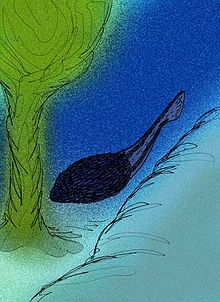Traquairaspidiformes
| Traquairaspidiformes Temporal range:
| |
|---|---|

| |
| reconstruction of T. cambelli | |
| Scientific classification | |
| Kingdom: | |
| Phylum: | |
| Class: | |
| Order: | Traquairaspidiformes
|
| Family: | Traquairaspididae
|
| Type species | |
| Cyathaspis campbelli | |
| Genera | |
Traquairaspidiformes is an order of extinct heterostracan agnathan fish known from the Silurian and Early Devonian periods. It is predominantly known from Late Silurian fluvial deposits from Wales and England: some species were also found in shallow water marine environment in Canada and North America.[2]

The head-shield and body armor of most traquairaspids form an almond shape. Plates have a distinctive ornamentation of tubercles: this ornamentation is very similar to the plate ornamentation of the heterostracan Weigeltaspis. This similarity of ornamentation creates much confusion over the taxonomical placement of Weigeltaspis, in addition to confusion over whether or not an isolated plate is of Traquairaspis, or of Weigeltaspis.[3] The armor of T. symmondsi (syn. Phialaspis symmondsi) is shaped like a jet plane or paper airplane, with pointed wing-like crests and a dorsal crest near the posterior end of the armor. The body of "Yukonaspis," Traquairaspis angusta, is greatly elongated, based on the holotype of a ventral plate.
Most species of traquairaspids are placed within the type genus Traquairaspis; most of the other genera, such as Phialaspis, Toombsaspis, and "Yukonaspis," have been synonymized into Traquairaspis.
References
- ^ Broad, David Stephen. "Lower Devonian Heterostraci from the Peel Sound formation, Prince of Wales Island, Northwest Territories." (1969). [1]
- ^ Dineley, DL (1964). "New specimens of Traquairaspis from Canada". Palaeontology. 7 (2): 210–219. [2]
- ^ Tarlo, Halstead. "LB t1965) Psammosteiformes tAgnatha)—A review with descriptions of new material from the Lower Devonian of Poland, II. Systematic Part." Palaeontologia Polonica 15: 168. Pages 20-21
